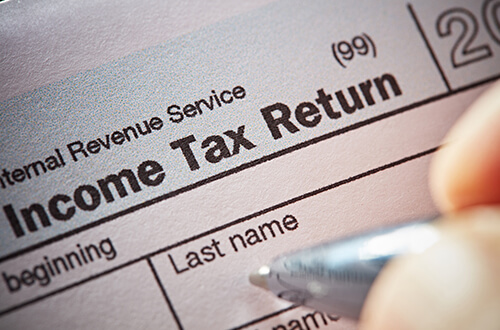Protect Yourself from Tax Scams

With tax time approaching, it brings an unfortunate share of tax scammers. Though there is the risk of encountering financial fraud artists at any time throughout the year, scammers get extra creative during tax season, using fear tactics to intimidate taxpayers. They may even impersonate the IRS and make demands, hoping that you will act quickly from fear of breaking the law rather than recognizing their ruses for what they are: a scam.
It’s important to stay extra vigilant during tax season. One of the best ways to avoid tax scams is by familiarizing yourself with how the IRS typically contacts taxpayers. This way you will be able to detect any scam artists who claim to be affiliated with the IRS, but in reality are looking to take advantage of unsuspecting tax filers. Remember, the IRS is an official government agency, and will contact you as such.
Keep a careful eye out for these common red flags that indicate you may be dealing with a financial fraud artist:
Unsolicited Communication
First of all, know that the IRS does not initiate contact with taxpayers by email, text message, or especially social media direct messages to request personal or financial information without any prior communication. Any official communication from the IRS will arrive via a letter in the mail, delivered by the United States Postal Service. In the case that you do have an overdue tax bill or delinquent tax return, you will still receive several official notices in the mail before you begin receiving any phone calls or visits to your door.
Unsecure Payment Methods
The IRS will never call you and demand immediate payment over the phone, especially via specific payment methods like gift cards or prepaid debit cards. No official government agency will request to receive payment in the form of gift cards. The IRS will also never ask for debit and credit card numbers over the phone. If you do owe taxes, you will receive a bill in the mail from the IRS, and tax payments will always need to be made payable to the United States Treasury.
Unfounded Threats
The IRS will never threaten your arrest by either local police officers or immigration officers. The IRS also cannot revoke your driver’s license or immigration status, and any threats of such are emotional intimidation tactics intended to trick potential victims into compliance with their scams.
Additionally, the IRS will never demand that you pay taxes without first giving you the opportunity to question or appeal the amount that you supposedly owe. It’s important to know your rights; any attempt to circumvent your rights should be taken as a red flag.
Additional Protection Tips
- File your taxes early, if possible. Tax fraudsters will file false returns using stolen Social Security numbers early on in the tax season, before most taxpayers get around to filing their own returns. The victimized taxpayer will be none the wiser until they start the process and are then informed that someone else has already filed a return in their name, and collected their refund.
- If filing your taxes online, fill out your return from your home computer rather than a public computer. Using a public Wi-Fi network leaves you unsecured and opens the door for fraudsters to steal any personal data that may have been transmitted or temporarily stored on the device.
- Use strong passwords, and use a tax preparation service or software that requires multi-factor authentication to log in. Multi-factor authentication adds an extra step in the verification process to confirm your identity when logging in. This added level of security makes it more difficult for someone else to access your account information.
- Choose a legitimate and professional tax preparer. If someone promises an unusually large tax return without reviewing your finances, they are likely a scam artist. Review their credentials and ask for references before making any decisions. The IRS provides a Directory of Federal Tax Return Preparers that you can use to find one near you.
- Remember that the IRS does not send unsolicited emails to the public. The IRS would not include or attach any sensitive documents in an email, such as a tax transcript. If you receive an email claiming to be from the IRS regarding your tax bill, do not click on any links or open any attachments. If you receive unsolicited emails claiming to be from the IRS, forward them to phishing@irs.gov and delete the email.
- If you receive suspicious phone calls or messages, do not engage with the scam artist, do not give out any information, and do not call them back. Hang up and ignore them.
- You can report phone scams to the Federal Trade Commission via the FTC Complaint Assistant on their official website, and add IRS Telephone Scam in the notes of your complaint. You can also contact the Treasury Inspector General for Tax Administration via the IRS Impersonation Scam Reporting online form, or you can call 800-366-4484. Additionally, you can contact the Office of the Attorney General for your state or other consumer advocacy agency, such as the Georgia Department of Law Consumer Protection Division.
Always bear in mind the number one piece of advice when it comes to protecting yourself from scams and fraud: if it sounds too good to be true, it probably is. Keep your wits about you this tax season so you can protect yourself against any attempts at financial fraud.
At Robins Financial Credit Union, safeguarding our members’ information is a top priority. To learn more about how we protect our members every day, give us a call or stop by any of our branch locations.

